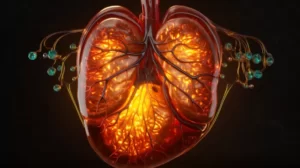You might already be aware that cigarette smoke is terrible for your health, but did you know that every puff of a cigarette contains approximately 4,700 different chemicals and 100 trillion free radical molecules? These reactive substances wreak havoc on your lung tissue by chemically reacting with DNA, cell membranes, and other molecules in your lungs.
Lucky for us, our lungs have access to an antioxidant called glutathione that protects them from the majority of the damage caused by cigarette smoke. Found in the fluid bathing the airways, glutathione reacts with reactive species in tobacco smoke, thus preventing damaging reactions with lung tissue.
The Dangers of Cigarette Smoke
According to Brian Day, a professor of medicine at National Jewish Health in Denver, “This natural protective response actually allows people to smoke. Without it, all smokers would suffer significantly more lung damage.” Day’s studies indicate that smokers who eventually develop lung cancer and chronic obstructive pulmonary disease (COPD) are likely at a higher risk due to infections that compromise the lung’s immune defenses.
Despite our lungs’ natural protective measures, smoking remains hazardous and extremely harmful to our health. Long-term exposure to cigarette smoke significantly increases the risk of various cancers, heart disease, and respiratory diseases. According to the Centers for Disease Control and Prevention (CDC), smoking is the leading cause of preventable death in the United States, accounting for more than 480,000 deaths—or roughly one in five deaths—every year.
What Are Free Radicals, and Why Are They Harmful?
Free radicals are unstable molecules with an uneven number of electrons. They’re produced in the body during natural processes like metabolism and immune response. However, external factors such as radiation, pollution, and cigarette smoke can also generate excessive amounts of free radicals.
These unstable molecules steal electrons from other atoms in their quest for stability, causing a chain reaction of damage known as oxidative stress. Over time, oxidative stress can lead to cell and tissue damage, inflammation, and an increased risk of chronic diseases such as cancer, heart disease, and Alzheimer’s disease.
Antioxidants, like the glutathione found in our lungs, help to neutralize free radicals and prevent the damage caused by oxidative stress. A healthy diet rich in antioxidants can also help to protect your body from the harmful effects of free radicals.
Boosting Antioxidant Levels and Reducing Exposure to Free Radicals
To protect yourself from oxidative stress caused by cigarette smoke and other environmental factors, focus on eating a diet rich in antioxidants and taking steps to reduce your exposure to harmful substances.
Eat a Diet Rich in Antioxidants
Foods high in antioxidants help counteract the damaging effects of free radicals. Some of the best sources of antioxidants include:
- Fruits: berries, grapes, oranges, kiwi, and pomegranates
- Vegetables: kale, spinach, broccoli, and bell peppers
- Nuts and seeds: walnuts, almonds, sunflower seeds, and flaxseeds
- Beans and legumes: black beans, kidney beans, and chickpeas
- Whole grains: quinoa, brown rice, and oats
- Green tea
You can boost your glutathione levels by consuming foods rich in this antioxidant, such as garlic, onions, cruciferous vegetables (like broccoli and cauliflower), and avocados.
Reduce Exposure to Cigarette Smoke and Other Harmful Substances
Quitting smoking and avoiding exposure to secondhand smoke are some of the most critical steps you can take to protect your health. In addition, consider the following steps to reduce your exposure to free radicals:
- Limit exposure to air pollution by staying indoors on high-pollution days and using air purifiers in your home
- Use sunscreen and protective clothing to shield your skin from harmful UV rays
- Minimize your use of chemical-laden household cleaners and personal care products
The Bottom Line
Even though our lungs have a built-in defense mechanism against the damage caused by cigarette smoke, it’s essential to remember that smoking is still a significant health risk. A healthy diet rich in antioxidants and implementing lifestyle changes to reduce your exposure to free radicals can help counteract oxidative stress and promote overall health.



![8 Simple Rules to Refresh Your Body with a Healthy Cleanse [See Pictures]](https://naturalhealthreserve.com/wp-content/uploads/2024/01/8-rules-healthy-cleanse-slideshow-300x168.webp)